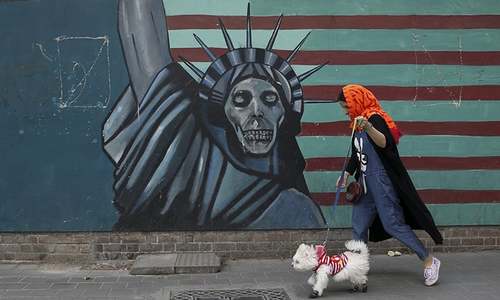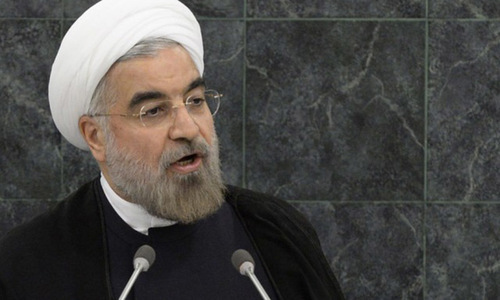WASHINGTON: President Donald Trump withdrew the United States from the Iran nuclear deal on Tuesday as his administration pledged to find a comprehensive and lasting solution to the so-called Iranian threat.
“The Iran deal was one of the worst and most one-sided transactions the United States has ever entered into,” Mr Trump said in a televised address from the White House Diplomatic Room.
“Today, we have definitive proof that this Iranian promise was a lie,” he added. “The fact is, this was a horrible one-sided deal that should have never, ever been made. It didn’t bring calm. It didn’t bring peace, and it never will.”
Explore: What is the Iran atomic deal and why is it being targeted
Minutes after the speech, US Secretary of State Mike Pompeo announced that the United States will not stop at revoking the deal alone.
“Sanctions will go into full effect and will remind the Iranian regime of the diplomatic and economic isolation that results from its reckless and malign activity,” he said. This reinstates all sanctions waived as part of the nuclear accord and imposes additional economic penalties as well.
The United States, he said, had a shared interest with its allies in Europe and around the world to prevent Iran from ever developing a nuclear weapon. “As we exit the Iran deal, we will be working (with) our allies to find a real, comprehensive, and lasting solution to the Iranian threat.”
Read: Don’t make others’ lives harder: UK, France, Germany urge US
Last week, Britain, France and Germany urged the Trump administration not to revoke the deal, arguing that the agreement was the best way of stopping Tehran from acquiring nuclear weapons.
President Trump ignored the advice.
President Rouhani says Iran will remain committed to multinational accord
Earlier on Tuesday, President Trump telephoned President Emmanuel Macron of France and told him that he was withdrawing from the Iran nuclear deal. President Macron visited Washington late last month to persuade Mr Trump not to do so.
Secretary Pompeo said the United States had taken other European allies into confidence as well.
“Our effort is broader than just the nuclear threat and we will be working together with partners to eliminate the threat of Iran’s ballistic missile programme; to stop its terrorist activities worldwide; and to block its menacing activity across the Middle East and beyond,” he said in a statement issued by his office.
Editorial: Undoing the Iran deal
In 2015, six nations — the United States, Britain, France, Germany, China and Russia — signed a nuclear deal with Iran, which was later approved by the UN Security Council as well. The deal, titled the Joint Comprehensive Plan of Action (JCPOA), became effective on Oct 18, 2015.
Mr Trump’s decision has unravelled the signature foreign policy achievement of his predecessor, Barack Obama. And critics appearing on various US television channels after the announcement warned that it would also isolate the United States from its allies.
Senior members of his administration watched as President Trump declared that he was revoking the deal because it failed to achieve its objective: protect the US and its allies from “the lunacy” of Iran developing a nuclear weapon.
Vice President Mike Pence, National Security Adviser John Bolton and Treasury Secretary Steven Mnuchin were among those who attended President Trump’s 11-minute address, which began around 2:15 pm.
The president took a few questions after the speech, saying that his actions on Iran “will make America much safer” and he was leaving the accord because the Iranian regime was the leading state sponsor of terror.
“Over the years Iran and its proxies have bombed American embassies and military installations, murdered hundreds of American service members and tortured US citizens,” he said.
Mr Trump claimed that the agreement “allowed Iran to continue enriching uranium” and “lifted crippling economic sanctions” in exchange for “very weak limits” on its nuclear programme. The nuclear accord, he said, was “a great embarrassment to me as a citizen” and “a horrible, one-sided deal that should have never, ever been made”.
He called the sunset provisions “totally unacceptable,” which did “nothing to constrain Iran’s destabilizing activities” in the region.
He said he walked out of the arrangement when it became obvious to him that the deal could not prevent an Iran nuclear bomb.
“The United States will withdraw from the Iran nuclear deal” and impose “the highest level” of economic sanctions on Tehran, he said. “America will not be held hostage to nuclear blackmail.”
At the end of his remarks, President Trump signed the proclamation to withdraw from the JCPOA.
Related: Netanyahu hails US decision
He announced near the conclusion of his remarks that Secretary Pompeo was arriving in North Korea shortly to finalise the arrangements for his summit meeting with Kim Jong Un. He said he’s hopeful that three Americans held in North Korea will soon be released.
Reacting to Mr Trump’s announcement, President Hassan Rouhani said that Iran would remain committed to the multinational nuclear deal, reports Reuters.
“If we achieve the deal’s goals in cooperation with other members of the deal, it will remain in place... By exiting the deal, America has officially undermined its commitment to an international treaty,” President Rouhani said in a televised speech. “I have instructed the Iranian Atomic Energy Organisation to take the necessary measures for future actions so that if necessary we can resume industrial enrichment without limit,” he said in an address to the nation.
“We will wait several weeks before applying this decision. We will speak with our friends and allies, the other members of the nuclear agreement,” he said. “I have ordered the foreign ministry to negotiate with the European countries, China and Russia in coming weeks. If at the end of this short period we conclude that we can fully benefit from the JCPOA with the cooperation of all countries, the deal would remain,” he added.
Published in Dawn, May 9th, 2018
































